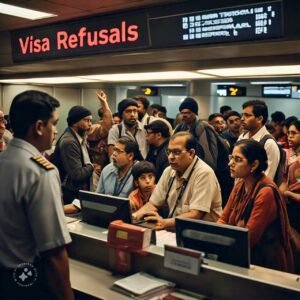Conclusion
Visa refusals can be challenging, but understanding the process helps in navigating them effectively. Being aware of common refusal reasons allows you to address potential issues before applying. Accurate documentation and meeting all requirements are essential to avoid delays and denials. By preparing thoroughly and providing complete information, you increase your chances of approval.
If you face a visa refusal, carefully review the reasons provided. Gather additional documents and submit a well-prepared appeal if necessary. Following the specific appeal guidelines for the country can make a difference. Consider consulting with immigration experts if needed to strengthen your case.
Remember, careful preparation and attention to detail are key in the visa application process. Avoiding common pitfalls and addressing any concerns can lead to a successful outcome. Understanding and following these guidelines will help you navigate visa applications more effectively. With proper preparation and a clear approach, you can overcome the challenges of visa refusals and achieve your travel or work goals.
FAQs
1. What is a visa refusal?
A visa refusal occurs when a visa application is denied by the immigration authorities. This decision prevents the applicant from entering the country.
2. Why might my visa application be refused?
Common reasons include incomplete application forms, inadequate financial proof, insufficient documentation, or concerns about your travel history and intentions.
3. How can I avoid a visa refusal?
To avoid a refusal, ensure your application is complete and accurate. Provide all required documents, demonstrate financial stability, and show strong ties to your home country.
4. What should I do if my visa application is refused?
Review the refusal notice to understand the reasons. Gather additional evidence if needed, and consider submitting an appeal or reapplying with corrected information.
5. How do I appeal a visa refusal?
Submit an appeal within the specified time frame. Include additional documents or evidence that address the concerns raised in the refusal notice. Follow the specific appeal process for the country.
6. Can I reapply for a visa after a refusal?
Yes, you can reapply. Ensure you address the reasons for the previous refusal and provide a complete, accurate application with any new supporting documents.
7. How long does it take to process an appeal?
Processing times vary depending on the country and the complexity of the case. Check with the relevant immigration authorities for estimated timelines.
8. Can a visa refusal affect future applications?
Yes, a visa refusal can affect future applications. It may impact how your new application is assessed, so address any issues from previous refusals.


